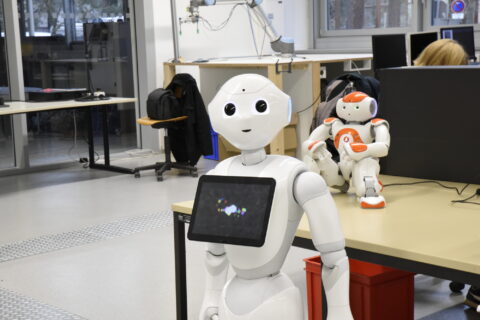On first name terms with robots
Research consortium investigates robots’ potential social skills
Robots and AI are growing in importance – in industry, services, medicine and in private settings. The Bavarian Research Foundation and a Bavarian consortium from industry will jointly invest almost four million euros in the coming two years in the research consortium FORSocialRobots that is aimed at significantly improving the social skills of automated systems and robots. Prof. Dr. Jörg Franke, head of the Institute for Factory Automation and Production Systems at Friedrich-Alexander-Universität Erlangen-Nürnberg (FAU), will assume the role of speaker for the research project set to run over three years.
The research will focus on honing robots’ social skills in order to enable efficient and accepted interactions with people in various areas of application. Prof. Franke defines the goal of the research: “We hope to gain a basic understanding of the multimodal aspects of sociality and to learn how people express and read emotions, how they feel empathy and offer to help other people and how we can transfer these skills to automated systems.” Nina Merz, who coordinates the consortium at FAPS, adds: “Our main priority is not to develop robots that look similar to people from the outside, but rather to investigate scenarios in which the machines interact with people.” Dr. Sebastian Reitelshöfer, project manager at FAPS, underlines: “If we want social robots to be a success, they must adjust to us and not the other way around. There is no way round that. Although when working with new tools, human behavior patterns must also evolve accordingly.”
From logistics, to production, to services and care work
The goal of the consortium behind FORSocialRobots is for people and robots to work together effectively in flexible teams in various areas. The project, split into five sub-projects, aims to improve robots’ social skills in six fields of application: Quality management, logistics, production, services, care homes and dementia centers. The sub-projects deal with the architecture of social skills, social situational communication, social adaptive and proactive interaction, simulation and validation of socially cognitive robots using digital twins, and human-robot interaction in the work context.
Social interaction particularly challenging
Autonomous interaction with people entails particular challenges. It is crucial that communication is as natural as possible and does not appear frightening to people, as otherwise this severely hinders the acceptance of the technical helpers. However, this can prove to be the first stumbling block, as social interactions tend to be highly complex with subtle nuances. In addition, robots may not always have the technical capacities they would require and adjusting them to cope with the various application scenarios is a costly procedure. Bearing that in mind, one of the project’s objectives is to check which findings, no matter whether they are gained on the factory floor, in a restaurant or in a care home, can be transferred to other purposes and locations.
How can robots be used in sensitive environments?
One scenario is aimed at investigating how a robot that is partly remotely supervised and partly acts autonomously can work together with people in sensitive settings such as a nuclear environment. The machine should be in a position to assess interactions with people and react appropriately. But not only that: The researchers also analyze when the machines’ behavior appears understandable, plausible and at the end of the day acceptable for humans.
In demand: Hospitality
Another scenario concerns the catering business. There, robots should learn to cope with plates and trays, for example to recognize when a plate is empty and then to offer guests the task “clear plates away”. As well as technical challenges such as a highly dynamic setting in a restaurant or function room, robots come into contact with guests who, unlike employees in a company, have no idea what to expect. In such cases, the elements of surprise, dynamics and hospitality all play a major role.
Flexibility in demand in the dementia center
Other scenarios involve applications in health care, where robots can support care staff. One example of a particularly complex environment is an inpatient dementia center. There, robots come into contact with three very different groups of people – staff, visitors and residents. Depending on whom they are interacting with, the robots must be able to adapt their strategies flexibly, without, for instance, requiring a complicated authentication process. They therefore have to be able to effectively recognize intentions and emotions and react appropriately and in a clearly understandable way. However, the most important thing is: It must be ruled out that users can unintentionally trigger an inappropriate reaction from the machine.
More on FORSocialRobots
Detailed information on FORSocialRobots is available directly from the Bavarian Research Foundation:
https://www.bayfor.org/de/unsere-netzwerke/bayerische-forschungsverbuende/forschungsverbuende/association/forsocialrobots.html
Notes for media
Various options for photos and video clips are available for the individual projects. If you are interested, please contact Sebastian Reitelshöfer, sebastian.reitelshoefer@faps.fau.de, directly.
Those involved at FAU:
At FAU, as well as Prof. Franke from FAPS, who is the speaker for the sub-project “Architecture of social skills”, Dr. Sebastian Reitelshöfer, also from FAPS, and Prof. Dr. Cornelia Niessen from the Chair of Work and Organizational Psychology are involved in the sub-project “Human-robot interaction in a work context”.
Scientific partners:
Fraunhofer Institute for Casting, Composite and Processing Technology IGCV, Fraunhofer Institute for Integrated Circuits IIS and Augsburg University
Associated partners:
IG-Metall Bayern (Munich), Kompetenzzentrum Mittelstand (Garching), Brachland-Ensemble (Nuremberg), Siemens (Erlangen and Nuremberg), navel robotics (Munich), Bionicum (Nuremberg)
Industrial partners:
Astrum IT (Erlangen), audEERING (Augsburg), BioID (Nuremberg), Blank Hotel (“Das Hürner”, Ansbach), Framatome (Erlangen), Sozialstiftung Bamberg Altenhilfe, IFOHRA (Bamberg), Korian Deutschland (Munich), Krones (Neutraubling), KUKA Medical (Augsburg), Mey Maschinenbau (Prien am Chiemsee), Roboception (Munich), Senioren-Wohnstift Mozart (Ainring), Ulrichswerkstätten (Augsburg)
Further information
Dr. Sebastian Reitelshöfer
Institute for Factory Automation and Production Systems
Phone: + 49 162 26 04 719
sebastian.reitelshoefer@faps.fau.de
